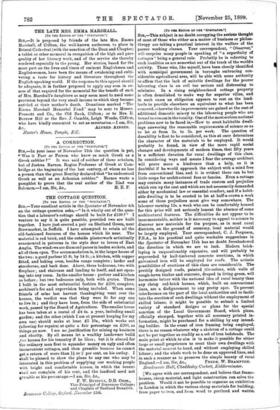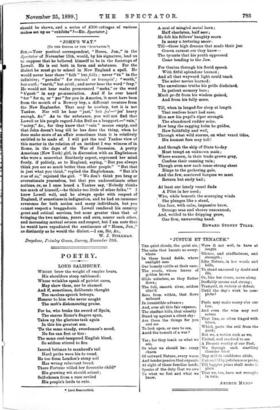[TO TER EDITOR OP TEl "SpEor1soa."3 SIR,—Thie subject is no
doubt occupying the serious thought of most of those who either as a matter of business or philan- thropy are taking a practical interest in the welfare of the poorer working classes. Your correspondent, "Observer," will surprise many people in speaking of "a superfluity of cottages" being a general rule. Probably he is referring to such localities as are somewhat out of the track of the world's activity. Those who, like myself, have been closely identified with municipal government in boroughs embracing con- siderable agricultural area, will be able with some authority to affirm that the lack of suitable dwellings for the poorer labouring class is an evil too serious and distressing to minimise. In a rising neighbourhood cottage property is often demolished to make way for superior villas, and in such cases an obligation appears to rest on the land- lords to provide elsewhere an equivalent to what has been removed. otherwise the improvements are gained at the cost of additional domestic misery to the labouring people who are bound to remain in the locality. One of the most serious national problems now to be faced is,—How to erect habitable dwell- ings answering the reasonable requirements of science so as to let at from 28. to 3s. per week. The question of durability is first to be considered, as this at once determines the character of the materials to be employed. It would probably be found, in view of the more rapid social changes and developments of modern times, that fifty years is a sufficient duration for rural dwellings of this class. In considering ways and means I fear the average architect will prove more a hindrance than a help, as it is doubtful if he would approach the subject with a mind free from conventional bias, and it is evident there can be but little scope for architectural fees or fancies. Even a cottage may contain many instances of trade custom and prejudice which run up the cost and which are not necessarily demanded either by mechanical law or essential comfort, and if a habit- able dwelling is to be erected to let at half-a-crown a week some of these prejudices must give way somewhere. The labourer earning 12s. a week who can be comfortably housed for this price will not seriously lament the absence of some architectural features. The difficulties do not appear to be insurmountable, neither is it necessary to appeal to science to discover new materials for the purpose, as in most rural districts, on the ground of economy, local material would be largely employed. Your correspondent, C. J. Ferguson, F.S.A., in his practical and quite workable suggestions in the Spectator of November 11th has no doubt foreshadowed the direction in which we are to look. Modern brick- laying is unquestionably expensive, and will probably be superseded by half-timbered concrete erections, in which galvanised iron will be employed for roofs. The artistic possibilities of erections of this class are considerable. The prettily designed roofs, painted tile-colour, with walls of rough-hewn timber and concrete, draped in living green, will harmonise better with the national idea of rural beauty than
any cheap red-brick houses, which, built on conventional lines, are a disfigurement to any pretty spot. To prevent interference on the part of the local authorities and to facili- tate the erection of such dwellings without the employment of skilled labour, it might be possible to submit a limited variety of standard designs or plans for the special sanction of the Local Government Board, which plans, officially stamped, together with all necessary printed in- formation, might be purchased for a shilling by any intend- ing builder. In the event of iron framing being employed, there is no reason whatever why a skeleton of a cottage could not be put together as readily as a set of iron bedsteads. The main point at which to aim is to make it possible for either large or small proprietors to erect their own dwellings with the material nearest to hand, and without employing skilled labour ; and the whole work to be done on approved lines, and in such a manner as to preserve the simple beauty of rural England.—I am, Sir, &c., FREDK. W. BRAMPTON. Brockencote Hall, Ch,addesley Corbett, Kidderminster.
[We agree with our correspondent, and believe that frame. houses, cheap material, and light construction can solve the problem. Would it not be possible to organise an exhibition in London in which the various cheap materials for building, from paper to iron, and from wood to portland and wattle, should be shown, and a series of 2100 cottages of various makes set up as "exhibits" P—En. Spectator.]











































 Previous page
Previous page